"Go play!" The root of a Labrador's life
Challenge and injury never dulled Whiskey's spirit, nor should it dim ours
“OK, go play now. You go play.”
Those were Whiskey’s favorite words whenever we stepped out of the truck or the back door. His release command to run and play and just be a dog.
And they were the last I would ever speak to him as he slipped away the morning of January 2.
This is published two weeks to the day after his death, and it still feels raw.
The thing is, it’s impossible to say the word “Whiskey” without forming a smile.
That danged dog always seemed to wear a smile. Out of the truck, out the back door, he bounced on his front paws and looked up at me for direction, always, in my mind, saying, “What we doin’? Are we chasin’ bumpers? Did you get birds? Did you lay a blood trail? Are we going for a walk? Want me to heel? What’s up! What’s up! What’s up!”
“OK, go play!” He’d tear out and run circles, pee in the usual spots, and sniff around to pee on any sign that any critter had touched his territory since the last time he’d checked the perimeter. He’d just be a Lab, trot around, goof off, roll on his back, pee, dig, sniff, scratch, find the bone he abandoned two days earlier, throw it in the air like a pup, and bounce it around and corral it with his front paws before he settled in for a long, satisfying chew.
We live in an HOA, in a row of houses surrounded by privacy fences—except ours. We like the open view and easy access to the city’s flood-control area, the trees, grass, slough, and little brushy areas—Whiskey’s home playground.
That’s where he had his last morning romp. A chilly morning always put a little extra energy in his step. The slough held a couple of mallards, and I let him stray a little longer so he could sniff them out and watch them flush, but it was time to wrangle him in with a soft double-whistle through my teeth and “heel in now, buddy.”
As always, he happily trotted up, planted his front paws, and swung his rear end around to sit in one fluid move. But as I let my hand drop to stroke his ear and look at him, as was our custom, his ear slipped away, and I felt his weight lean against my leg.
He had collapsed before, but not like this. I dropped to him and pulled him onto my lap. He was not breathing, and I felt his heart flutter to a stop. I cradled him through his death throes, held him close, told him it was OK, sobbed those last words into his warm neck, and he was gone.
I carried him to the couch and laid him on his blanket. DeAnna raced home from work to hug her handsome boy. We then took him to our friend Jack Morris’s Osage County ranch and buried him under the pecan tree next to our beloved black female Lab, Tag, who came to Oklahoma with us from Alaska.
She liked to play, too.
Enough with the tears now
If you take a dog into your home and your life, this is the sweet, painful way it always ends. Whiskey was my third Labrador. I loved them all, and saying goodbye never gets easier. The sudden loss of Whiskey hit us hard, but our lives are always richer for the experience of loving a good dog, and Whiskey was a sweet one.
Whiskey had a tough road in many ways, but that boy never lost his happy and loving disposition and poured 100 percent joy into whatever the day offered. That’s a good model for all of us.
AKC Yellow Labrador My Girl’s Sweet Mr. Whiskey died suddenly on the morning of January 2, 2025. He was 9 years old, 133 days short of what would have been his 10th birthday, May 15, our 05/15/15 boy.
He was my best buddy and business partner—note the KJB Outdoors logo. He liked lying under my desk and would nudge my hands off my keyboard and mouse to let me know I needed an editing break.
On Thanksgiving Day, 2016, he came to us as an 18-month-old knucklehead who believed everyone and everything loved him. He didn’t have an aggressive bone in his body. Professional dog handlers would call him a “soft” dog.
I honestly think he loved the ducks, geese, and deer we killed, too. Like he thought he was doing them a favor by bringing them to me—or me to them. It was all a big game. After all, we were both fantastic and happy beings; who wouldn’t love us?
We didn’t buy him. He was free. A top-bred quail dog at a Southwest Texas hunting ranch; a mysterious recurring leg injury as a pup put him so far off-schedule in training with others that his owner was at a loss as hunting season approached. He told my brother Brett he’d almost give him to someone if he knew they could make something of him and agreed not to neuter him if a need arose for that family legacy.
Brett said he knew a guy, and he and DeAnna conspired to surprise me with an early Christmas gift on Thanksgiving. Whiskey, however, will go down in our family history as the most expensive free dog we ever had.
They named him Whiskey because his siblings all were blonde, and he was more reddish. As the pups slept, he looked like a shot of whiskey poured into a cream liqueur. I registered him with the added, “My Girl’s Sweet Mr.” because DeAnna immediately called him “my sweet boy.”
My early assessment was that Whiskey loved fetching anything I could throw but was not necessarily interested in bringing it directly back. He was OK at walking at heel, sitting on command, and coming when called—most of the time. However, he didn’t know what “stay” meant. He pretended not to fully understand that command for his entire life, the stinker.
He loved the sound of gunfire, which made him bark incessantly. I left a gun-dog test one day because I was afraid he would hurt himself or overheat inside his travel kennel, scratching at the door, spinning in circles, and barking non-stop. It was pretty ugly.
We spent the first year of his life teaching him to sit still and not bark every time a shotgun went off. As often as we could, we’d go to trap or skeet shoots and sit there on the tailgate of my truck. First, a couple hundred yards away, then closer, then closer. Hours and hours we sat, I cradled him, petted him, held his muzzle, and said, “Quiet… It took months to get him off-leash and by my side as I shot a popper load.
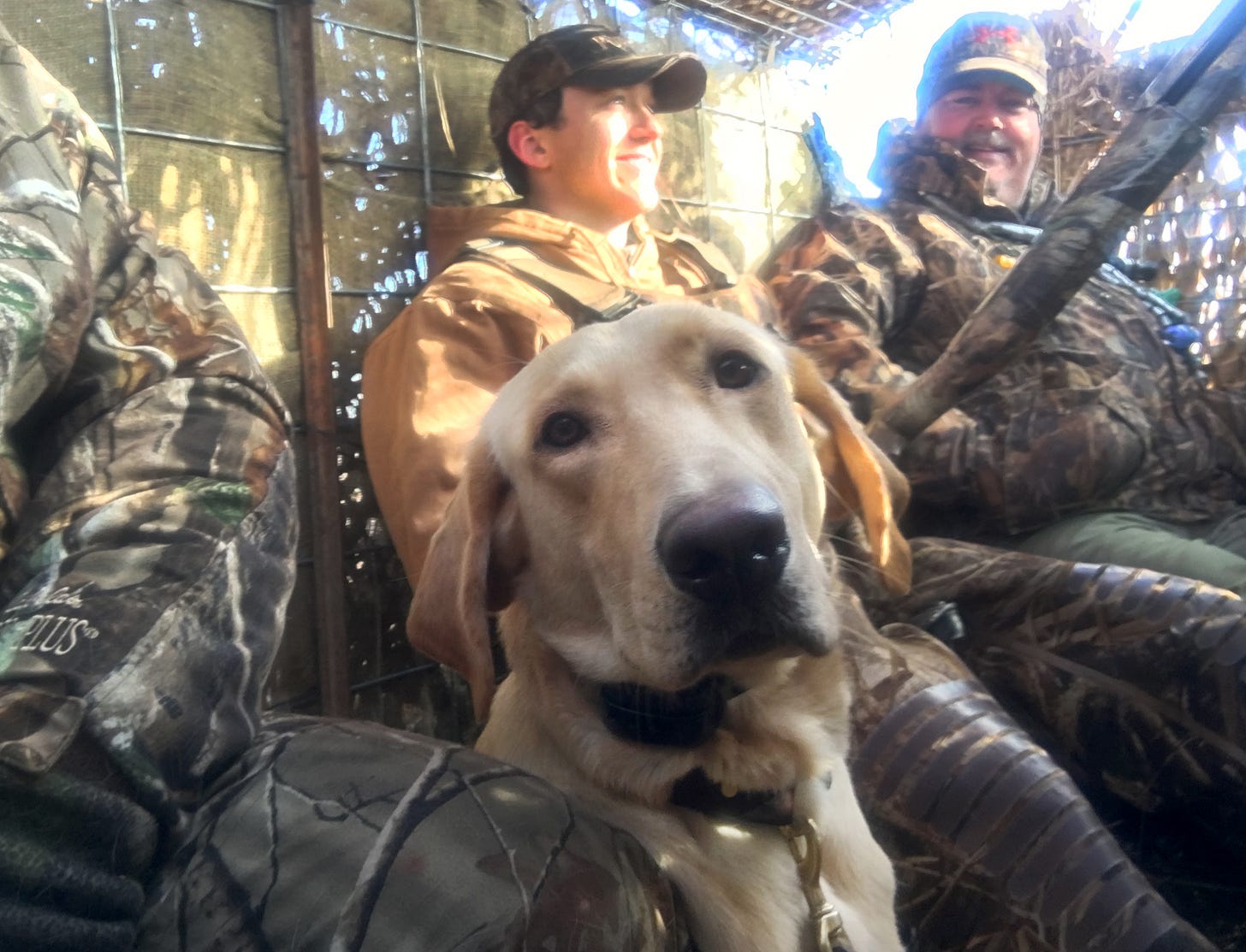
As a Southwest Texas quail dog, he had never seen water and had no clue how to swim. However, he did not fear the water and had no concept of depth, so we were good to go. When spring came, and the water warmed, I set about teaching a 2-year-old Lab how to swim. It took a couple of months. We both swallowed some water, but Whiskey’s enthusiasm never waned, and neither of us drowned, so that went well.
Kennel-raised, he high-stepped like a cat the first time his feet touched our carpeted floor, and he was nervous about the strange surroundings inside the house. But he never needed house training. He never got into the garbage or food he wasn’t offered, and he never messed up our furniture.
Aside from some understandable accidents, which he usually managed to confine to the kitchen tile floor or the area near the back door, he was a fantastic house dog from the get-go. The only time he barked in the house was if a cat found its way to the back porch or if he needed to go out.
He had a condition called lazy larynx, which caused his panting to sound like a Harley at fast idle. It made it hard to hear ducks in the duck blind, and it was annoying non-stop torture on a 3-hour car ride. On a youth hunt, one youngster asked how he could be so hot and panting so hard while belly-deep in cold water. A vet once advised us to watch that the condition did not progress into laryngeal paralysis.
He lived a happy life, and we believe he came to us as the perfectly imperfect dog at the ideal time, even if he drove us into the poor house with vet bills more than once. He answered to, “WhiskeyDog, Mr. Whiskey, My Sweet Boy, My Handsome Boy, Bonehead, Knothead, and HEY!! WHAT THE HELL ALREADY?!!”
My wife no longer proclaims, “Where’s my Handsome Boy?” as soon as she walks through the door after work, which confirms that her priority upon arriving home was always Whiskey, not her husband.
He innately understood that I seldom do what my wife tells me to do, so whenever she was tired of being pestered for affection and said, “Kelly, call him!” he came over to pester me without me saying a word. Eventually, all she had to say was, “call ‘im,” and he’d plod into my office.
He trained DeAnna to give up the crusts of her morning toast every day, pizza crusts during football games and movies, what to do with meat trimmings, how to clean yogurt off spoons or bowls, that it was OK to let him lick dinner dishes (sometimes), who should always get the first bites of any cheese—and to eventually resume petting his head if he ignored her “call ‘im.” He’d stop touching her with his paw or nudging with his muzzle, sit still, and look at her longingly and endlessly until she gave up and started petting him again.
Talented dog. That never works for me.
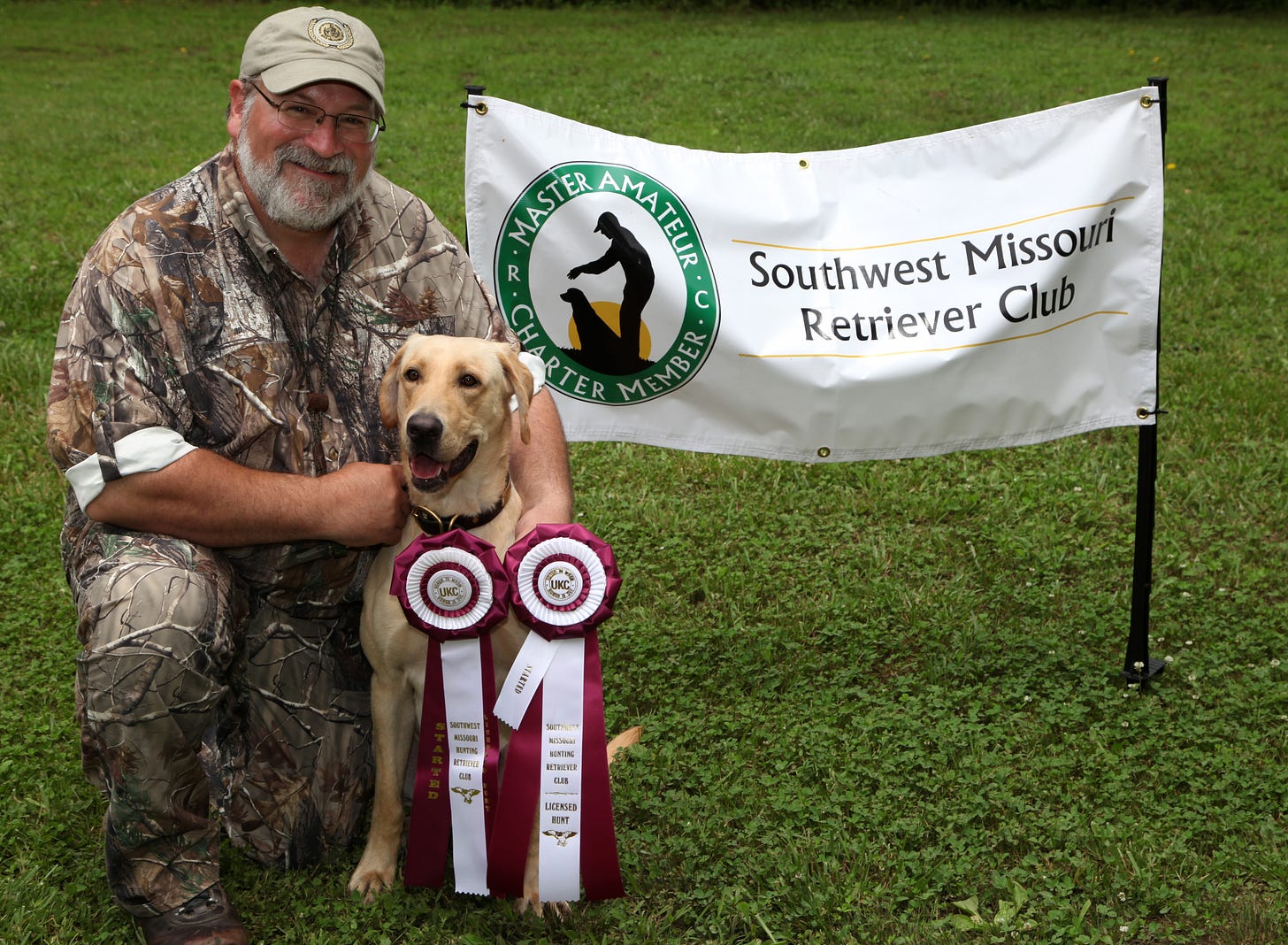
He passed his United Kennel Club Started Hunting Retriever certification before being sidelined by an ACL tear that required surgery. We kept hunting, but what would have been hunting test entry fees and travel money went into his vet bills.
Whiskey became very good at whistle commands, which retriever owners call “handling.” One day, he followed my directions to a bird more than 200 yards away. I gave him one last cast; he turned to disappear behind the brush, over a rise, and I held my breath. With a live mallard drake in his mouth, he was headed back a minute later.
Performance like that is worth all the ribbons you can ever earn.
He had great moments but embarrassed me more than once by breaking out of the duck blind before being sent. A pumper decoy that splashed water got us good one time. I call it a handler error. It was on me. He was experienced and had seen many different moving and splashing decoys, just not that kind. But Whiskey was so fixated on it all morning that when we fired some shots, he broke, ignored the fallen ducks, and swam directly to that decoy, messing it up.
Yep, that was my boy.
That excitement factor never ebbed and sometimes got the best of us. After I guaranteed a waterfowl guide that Whiskey wouldn’t break from his dog blind because we’d been working hard on it with the e-collar set to vibrate. He broke from his blind at the first gunshots, ran under and past a falling duck before it hit the ground, and raced across the field looking for it.
That’s when I noticed I’d forgotten to turn on my transmitter.
Guaranteed.
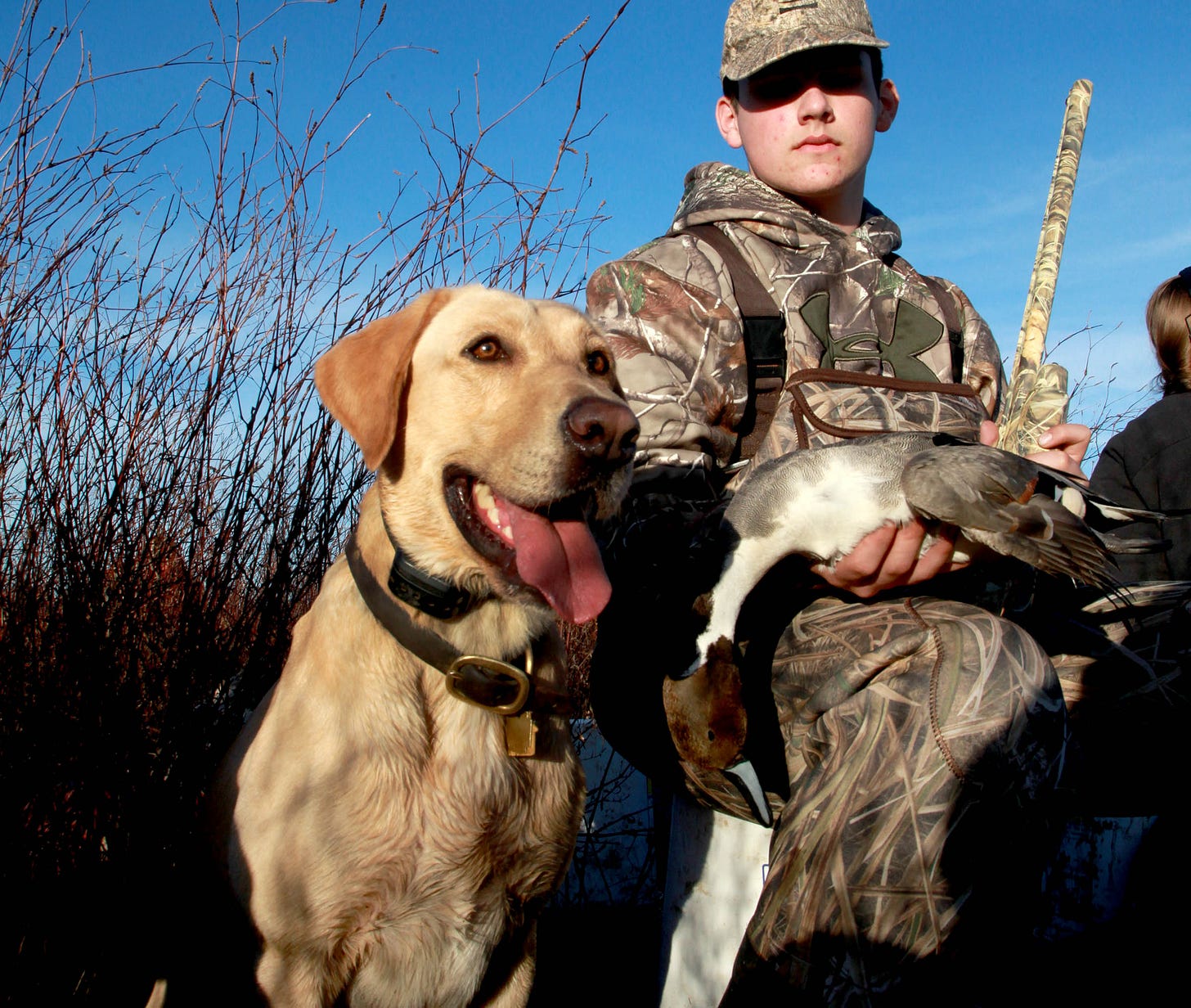
He learned to track wounded deer and earned his UBT-1 certification before a copperhead snake’ bite cut a season short, and then other health issues ensued.
He was a good tracker, and we were a decent team. We taught more than a few hunters that their “perfect broadside shot” was not as perfect as they thought, especially when the deer showed up on trail cams days or weeks later. The sound of the bells on his tracking harness was one of his favorite things.
He retrieved dozens and dozens of ducks on hunts with guides Jack Morris and Gordon Montgomery. He fetched ducks for youth hunters with guide Brad Albeck. He excelled at rounding up birds during organized pheasant shoots and had a heckuva nose for Oklahoma’s wild quail, even if we quit shooting at them the last few years.
So, what happened to Whiskey?
Four years ago, after I was laid off at Tulsa World, Whiskey and I had grand ideas. I would freelance, and we would entertain folks with videos and stories of our hunts, trails, and training sessions with other dog handlers as we planned to get back into the hunting test scene two years after his ACL surgery. We would also teach folks about his raw food diet as time allowed.
The welcome note to subscribers to this blog states, “Me and the Whiskey Dog thank you…”
We started in October 2020, and that copperhead struck while tracking deer the first week in November. That pretty much ended his hunting season that year.
We dropped out of the hunting dog test scene a few months later because his training schedule brought on a severe limp. After several columns about “my limping Labrador,” it turned out that the original injury to his other knee as a pup continued to be an issue. The ACL was fine and had an expected amount of arthritis and scarring. It was the other knee that was scarred and loaded with arthritis.
We did our best with home therapy, but he never regained a proper gait—not that Whiskey realized it. He remained a high-speed dog. Those rear knees were just a disaster waiting to happen.
He didn’t care about falling when he made tight corners. I cringed every time. One time, right behind the house, he slid, fell, and punctured his chest on a willow stub. After a windstorm, he jumped over a downed limb behind the house, and it sounded like someone hit a home run when his rear knees cracked that limb.
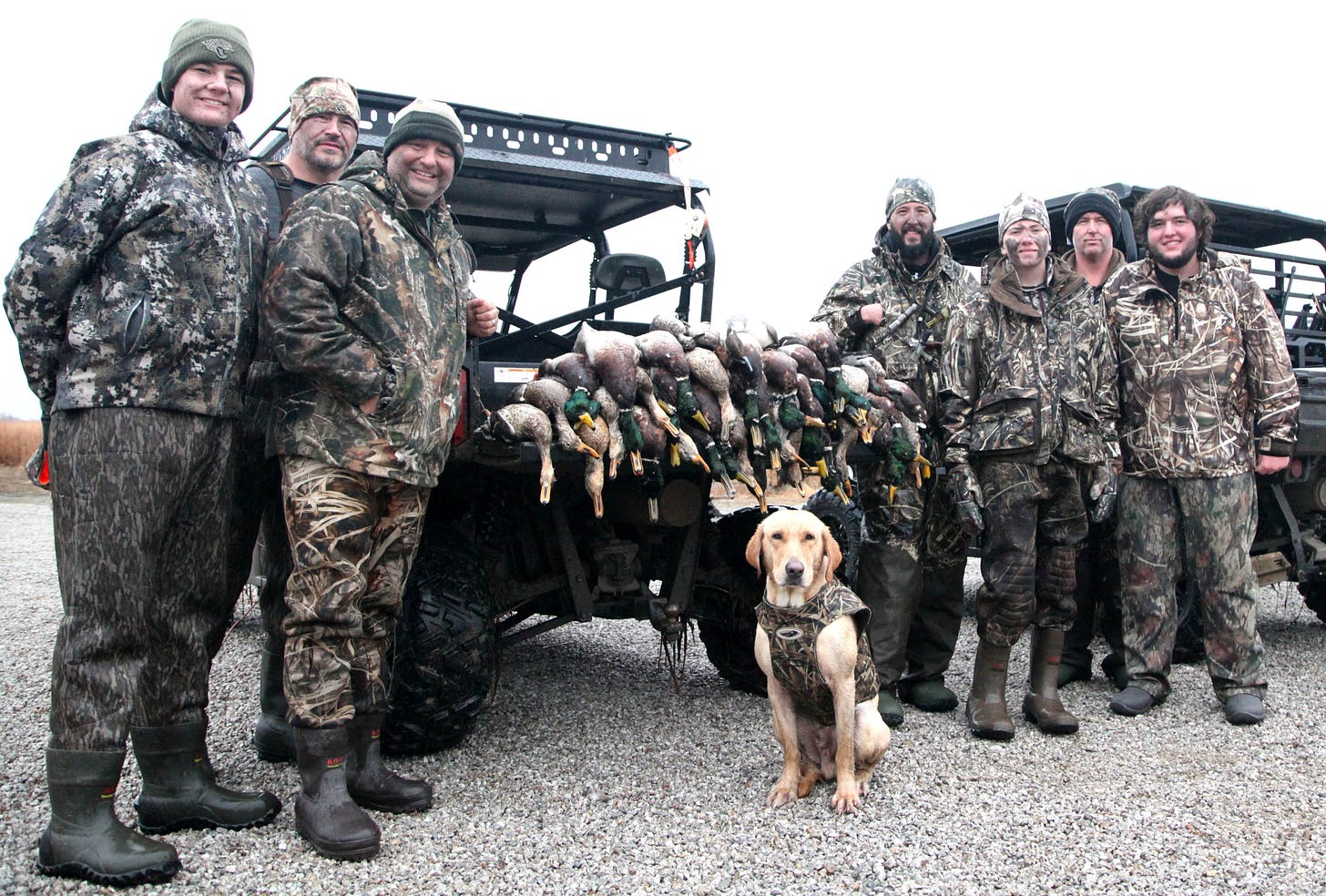
We did enjoy some long days afield on what I considered “safe” ground, such as fetching pheasants at organized shoots, but even after those days, he would walk on three legs with painkillers and close to $200 in injections and supplements each month. Mostly, we tracked “deer” through his playground, ran long drills, and “bumped into trails” that led him to snacks on trails” around soccer fields and city parks. We played where I could direct his footing.
We learned a lot and wrote columns about his sports therapy, hoping our efforts could help some folks. Although the treatments were costly, it was worth it. His home therapy never really ended.
Then came that first inexplicable collapse.
We were about to go outside when he became stiff and toppled over in the living room. It happened several times within a few weeks without rhyme or reason. Expensive tests showed nothing. Epilepsy? Heart issues? Was that lazy larynx developing into laryngeal paralysis with tachycardia?
Nothing conclusive. I always thought it would eventually become steady, something we could diagnose. But no.
In the house, the backyard, while running, standing up after lying about, hot summer days, cool pleasant days, weeks apart, months apart, entirely and utterly unpredictably, he would stop breathing, shudder, and collapse with a skyrocketing heart rate.
His health never deteriorated, and his checkups always looked great. Healthy as a horse, perfect weight, beautiful soft coat with minimal shedding—with a lazy larynx, crappy knees, and inexplicable collapsing.
Of course, Whiskey sprang up from collapses like it was no big deal. He’d stretch like he’d just been down for a nap, shake it off, and away he would go, happy as a lark.
It stopped me from taking him afield or swimming in deep water. I thought about doing rounds with him as a comfort dog, but the last thing you need is a comfort dog collapsing while it’s supposed to be comforting someone.
I never really gave up and never announced his “retirement.” He would be fine for months, and I’d think, “We can go.” Then he’d up and collapse.
Still, he lived the life of an exercised, healthy, and happy house dog who regularly tracked imaginary deer (with a meaty bone at the end of the trail) and retrieved plastic ducks felled with blank loads, always bolting from my side with a ‘yip’ like squealing tires on a fast little car.
He always returned with that signature flip around to heel, happy, panting, looking up to me and ready to do another or for me to tell him to go play.

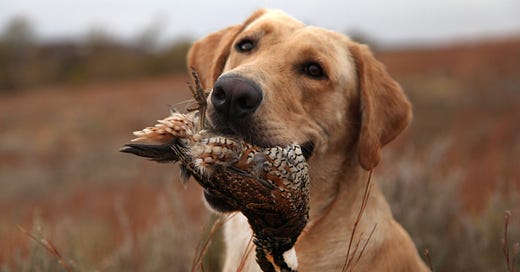




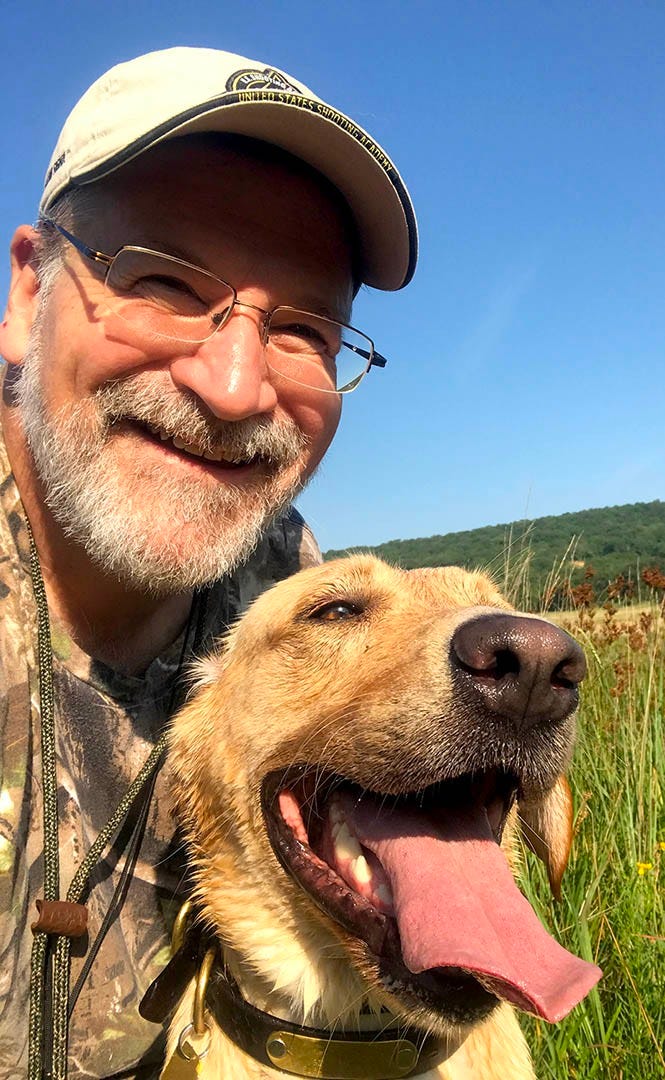
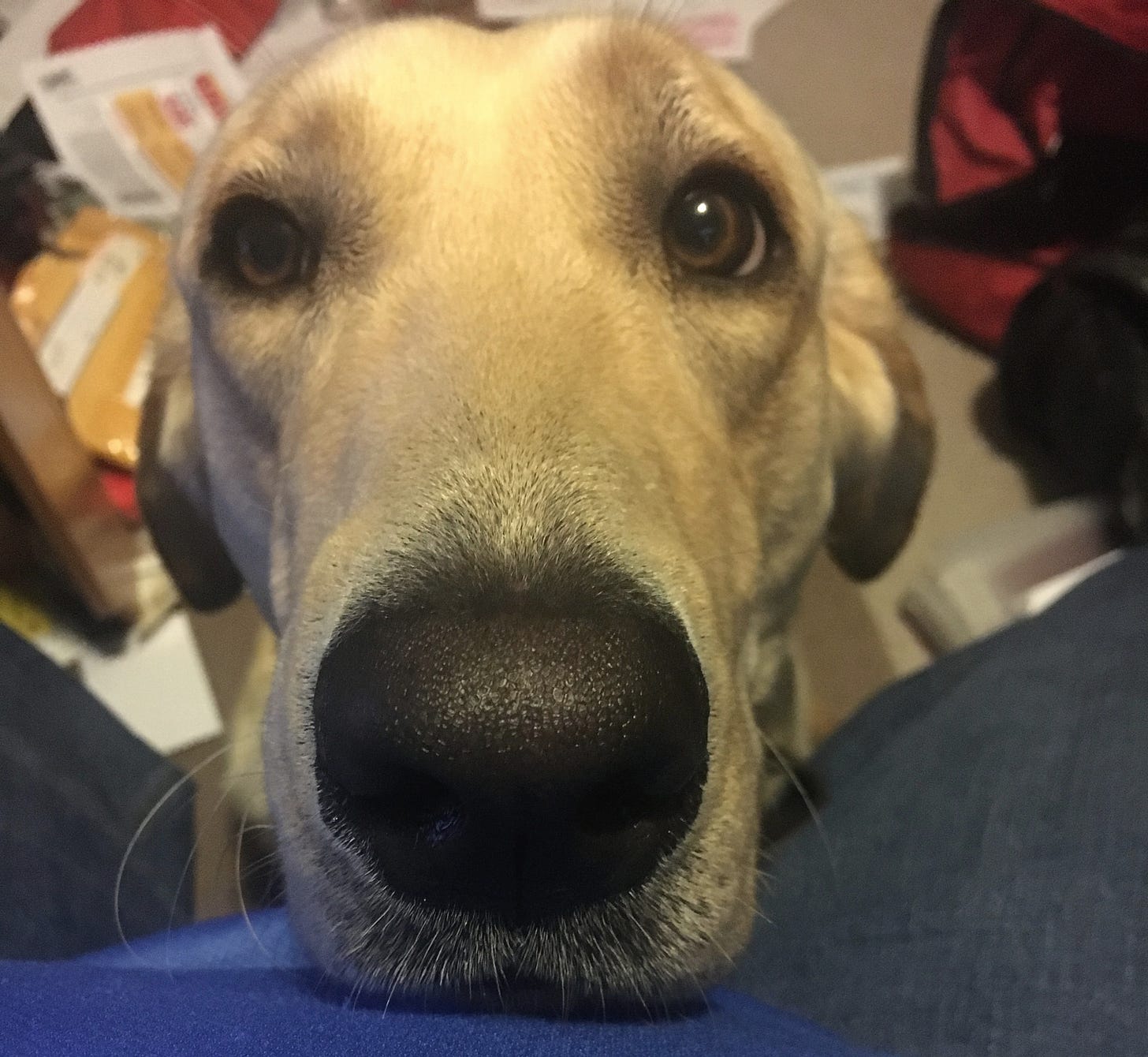
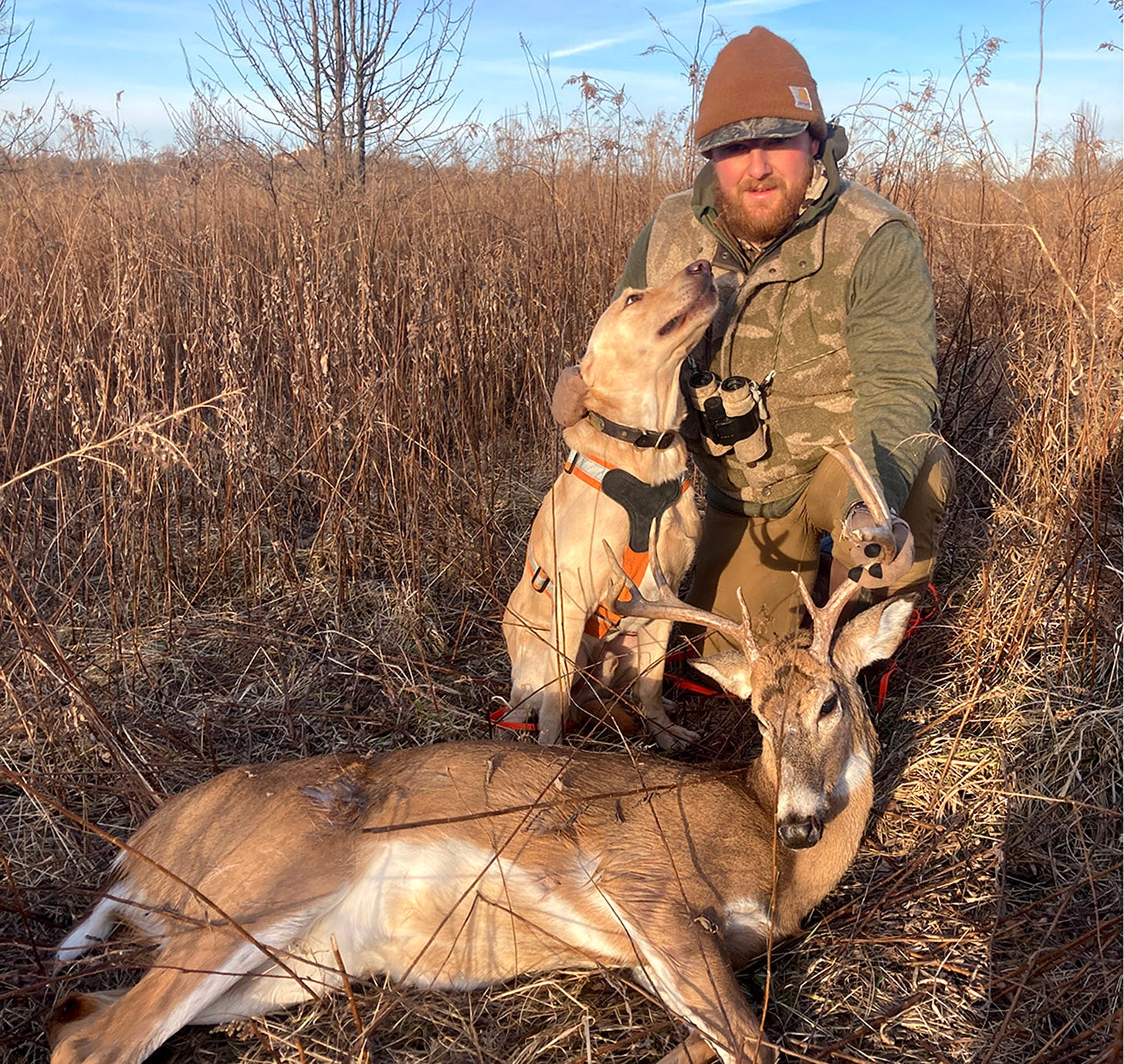

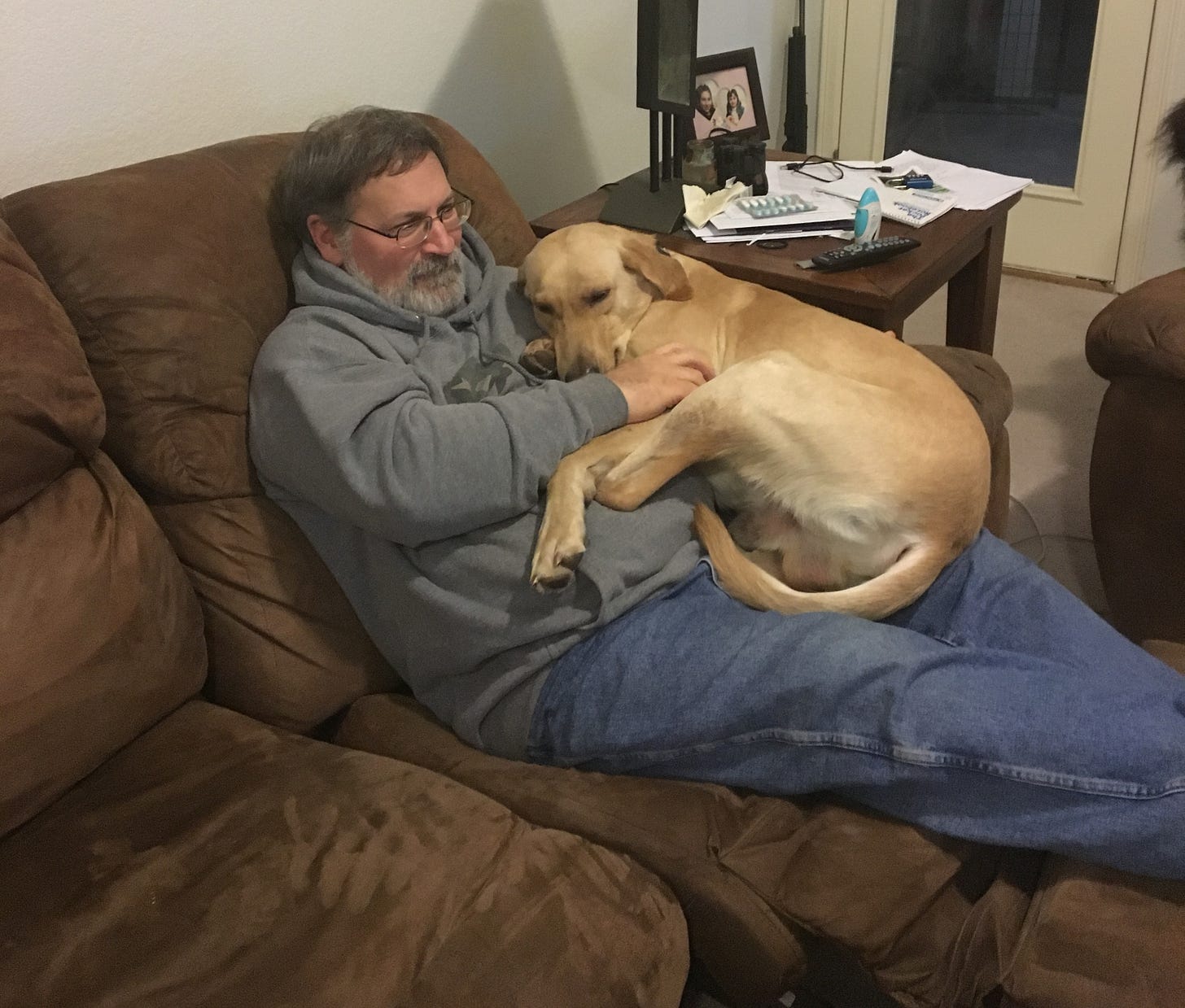
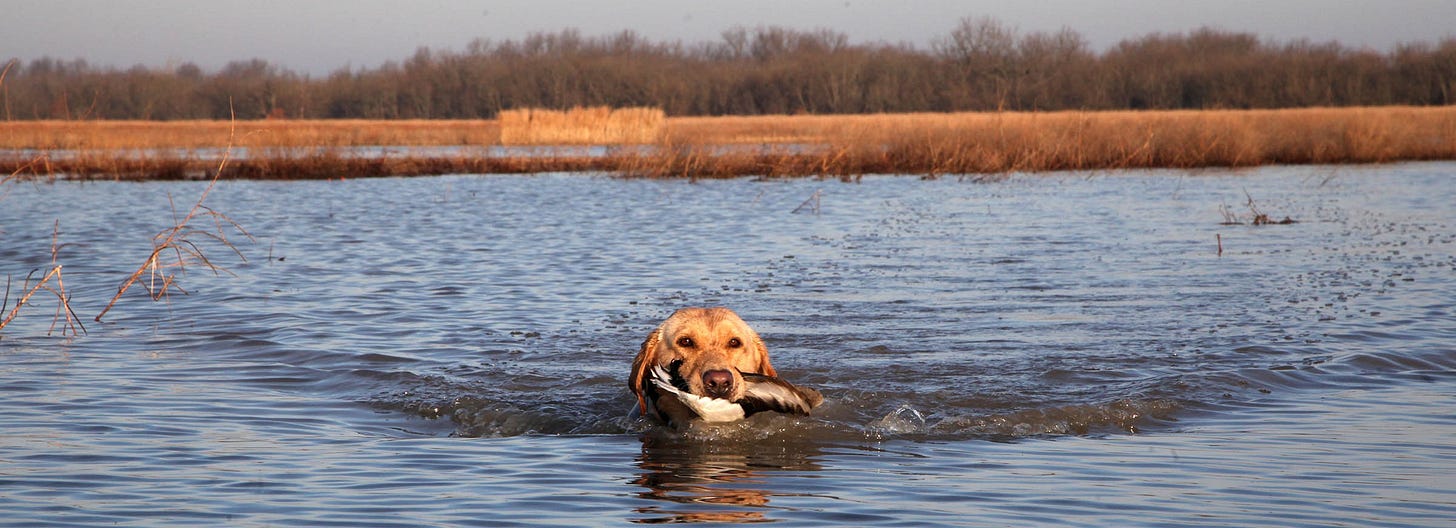
I am so very sorry for your loss.
Thank you. I know you are missing him.